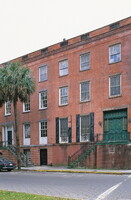Savannah: Topographic Views of the City Squares
Gilchrist, Scott

Download1B3-AB-S-G7_cp.jpg (588.8Kb)
Date
1997Description
View of row houses; James Oglethorpe, a military officer, led the first group of settlers to Georgia and founded Savannah in 1733, as a debtors' haven and buffer to Spanish Florida. He probably drew up the town’s distinctive urban plan, perhaps in association with other trustees. Unlike traditional new towns, Savannah was given no central square, no single hierarchical pattern and no boundary. Instead, it was based on an indefinitely extendable grid of ‘wards’, each measuring 600 ft sq. (c. 183 m sq.), focused on its own square and comprising sectors for public and private buildings and a diversity of street types. Four such wards were set out in 1733, and two more added in the following year. By 1851 there were twenty-four squares in the city; many contain monuments, markers, memorials, statues, plaques, and other tributes. Source: Grove Art Online; http://www.oxfordartonline.com/ (accessed 4/29/2011)
Type of Work
topographical view; photographSubject
architecture, cityscape, City planning, antebellum architecture, Twentieth century
Rights
Rights Statement
Licensed for educational and research use by the MIT community only
